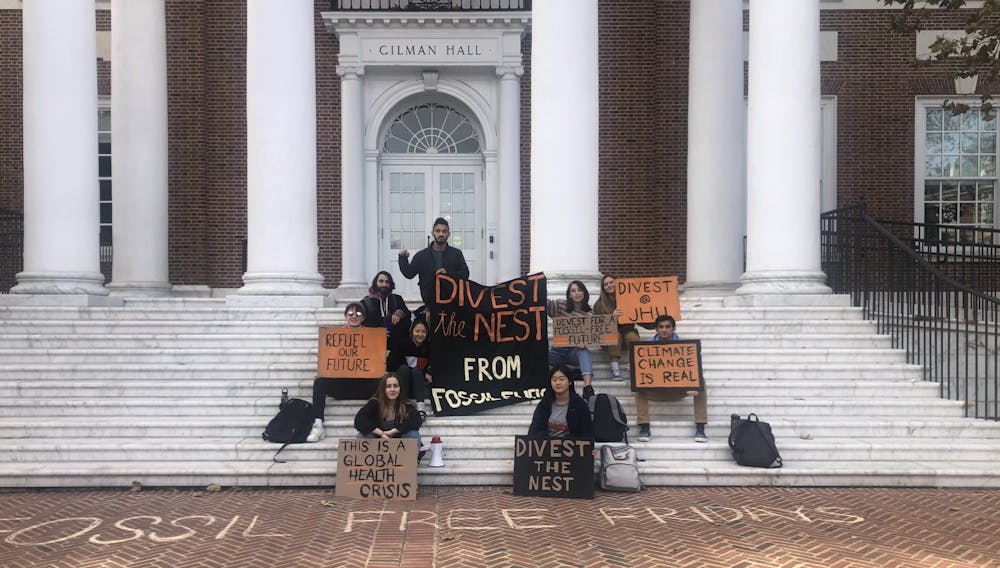Refuel Our Future (Refuel) held the first Fossil Fuel Friday demonstration from 1 p.m. to 4 p.m. on the steps of Gilman Hall last Friday. The group said that it will continue holding such demonstrations weekly until the University divests itself from the fossil fuel industry.
The Hopkins board of trustees voted to divest itself from companies that produce thermal coal in December 2017, following six years of Refuel’s campaigning and a recommendation by the Public Interest Investment Advisory Committee. The demonstrators are demanding that the University divest itself more fully.
At the event, Refuel executive board member Jeremy Berger, a junior, said that the decision to divest just from thermal coal was too small a measure.
“Hopkins divested from thermal coal a couple of years ago, which is like divesting from Blockbuster Video. It is anachronistic and they should divest from all fossil fuels,” Berger said.
Refuel organizer Elly Ren, a sophomore who helped plan the demonstration, agreed with Berger that the University should fully divest from the fossil fuel industry.
She argued that it is hypocritical for the University to position itself as a leading authority on climate change while it is still invested in industries that accelerate it.
“Hopkins tries to consider itself a climate leader and seem so amazing,” Ren said. “If you dig a little deeper, you see that where they put their money does not reflect what they preach.”
Ren said that for her, divestment is essentially a humanitarian issue. For the University to divest would send a strong message about its priorities, she explained.
“Even if they do divest because it is no longer profitable, we still want Hopkins to put people over profit. Fossil fuel divestment is still a sign of valuing people’s livelihoods and morals over purely economic profit,” Ren said.
Berger agreed with Ren’s assessment that the moral statement of divestment carries a lot of weight.
He argued that divestment is about realizing that future generations need to be protected.
“I think that the moral point is even more important. We are all going to be on this planet for decades to come and we want to protect it for yourself, future generations and all living beings,” Berger said.
Berger said that it was also the duty of the students to hold the institution accountable for their actions and to advocate for Hopkins to change course.
He went on to explain that the club would be protesting on Fossil Fuel Fridays to further raise awareness around campus.
“We are advocating for this to be a more democratic institution and for Hopkins to respond to the needs of the student body and our futures,” Berger said.
Refuel Co-President Colin Bowen, a senior, said that Refuel is preparing to meet with Provost Sunil Kumar in the upcoming month.
Bowen added that he thought Fossil Fuel Friday could show the administration that a lot of people were invested in fossil-fuel divestment.
“We are negotiating with the Provost and the President and making sure that the issue is on the forefront of people’s minds because there are a lot of issues that the University can be better on,” Bowen said. “It is our job to make sure that sustainability and climate stays in the discussion.”
Bowen said that there would be a financial advantage to divesting from fossil fuels because the effects of climate change were likely to disrupt the very global supply chains that the fossil fuels industry relies on.
He noted that this was the argument the University of California made when they divested $80 billion in pension funds from fossil fuel companies.
Refuel member Lais Santoro, a freshman, agreed with this assessment.
“There are renewable energy and new energy sources that are more financially viable for our school,” Santoro said.
In addition to pushing for the use of renewable energies, Santoro explained that Hopkins should also continue to reduce carbon emissions as a whole.
Santoro would like to see the University become more involved with the Baltimore community to address the environmental issues within the city at hand.
Berger argued that climate change is one of the most important issues of our generation. He said that students had the power to create change.
“As students here in this institution, we have the ability and power to hold [administrators] accountable and unify and stand up for what is right,” said Berger. “We can make the change happen and hope all of you do so.”





